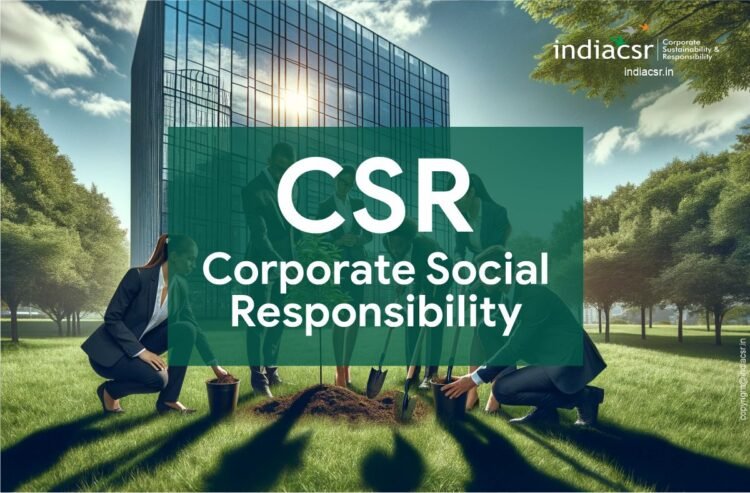As India reflects on a decade of mandatory CSR—a global first—policymakers face a pivotal choice: reinforce the status quo or recalibrate for equity and accountability.
NEW DELHI (India CSR): A decade after India pioneered mandatory corporate social responsibility (CSR) laws, spending has surged to unprecedented levels, yet persistent regional disparities, superficial compliance, and a drift toward centralized government funds are undermining its potential as a tool for equitable development, according to a new analysis in Economic & Political Weekly (EPW).
The commentary, authored by research scholar Atul Ghorpade and Sabuj Kumar Mandal from the Indian Institute of Technology Madras, draws on fresh parliamentary disclosures from March to August 2025. It reveals that CSR expenditure—mandated at 2% of average net profits for qualifying firms under Section 135 of the Companies Act, 2013—reached Rs. 34,909 crore in FY 2024, more than tripling from Rs. 10,066 crore in FY 2015. Over the past three years alone (2020–23), companies disbursed nearly Rs. 83,000 crore.
However, the authors highlight a “dual narrative” of progress and pitfalls. While aggregate figures paint a picture of regulatory success, they mask “stark spatial and distributional inequities.”
Geographic Imbalances Persist
Data from the Ministry of Corporate Affairs’ CSR portal shows Maharashtra capturing a quarter of total state-level spending (Rs. 60,675 crore from 2014–2024), with the top five industrialized states—Maharashtra, Karnataka, Gujarat, Tamil Nadu, and Andhra Pradesh—accounting for 56%. In stark contrast, the bottom 15 states and union territories received just 1.38%, and 24 out of 36 regions fell below the national average of Rs. 4,061 crore.
“Less industrialized states receive disproportionately low funds,” the authors note, attributing this to the law’s emphasis on spending in operational areas rather than high-need regions. Government calls to prioritize 112 “aspirational districts” have yielded minimal results: only Rs. 1,393 crore (under 5% of 2022–23 outlay) flowed there. Meanwhile, nearly Rs. 6,960 crore went to “pan-India” projects and Rs. 1,000 crore to centralized funds between 2022 and 2024—33% of total spending since 2015—diluting local impact.
Sectoral Skew Toward ‘Safe’ Bets
Spending patterns favor visible, low-risk sectors: education claimed over Rs. 10,000 crore and healthcare Rs. 6,800 crore in 2022–23, with environmental sustainability at Rs. 2,000 crore. Grassroots efforts like poverty alleviation, rural livelihoods, and gender equality lag far behind, fostering “sanitized philanthropy” that prioritizes branding over systemic change.
The trend toward centralization is accelerating, with Rs. 13,338 crore funneled to funds like PM CARES (Rs. 815 crore in 2022–23), Swachh Bharat Kosh (Rs. 55 crore), and Clean Ganga Fund (Rs. 41 crore) from 2018–2024. “For risk-averse firms, this is a dominant strategy,” the EPW piece argues, likening it to “quasi-taxation” that evades community engagement.
Compliance: From Ambition to Ritual
Governance remains board-led with mandatory disclosures via the MCA21 portal and audits under the Companies Auditor’s Report Order, 2020. Yet, enforcement is “minimal”: only 30 firms faced penalties totaling Rs. 19.94 crore between 2019–2024, a fraction of thousands obligated. The 2021 shift from criminal to civil offenses has further softened deterrence.
Analysis of firm-level data shows a “tick-box” shift: companies spending exactly 2% rose steadily post-2021, while those below the threshold dropped. Unspent funds persist, totaling Rs. 2,196 crore in 2024, often redirected to government accounts rather than local projects.
Using game theory, Ghorpade and Mandal describe a “low-effort equilibrium” where weak monitoring and rare penalties incentivize procedural compliance over innovation. “The law risks degeneration into a bureaucratic ritual,” they warn.
Calls for Reform
To unlock CSR’s transformative potential, the authors urge:
- Earmarking funds for aspirational districts and backward regions.
- Mandatory third-party impact assessments for large projects (outlay ≥₹1 crore) and randomized audits.
- Incentives like regulatory recognition for high-impact, underserved sectors.
- Greater community and civil society involvement to foster collaborative, context-sensitive development.
As India reflects on a decade of mandatory CSR—a global first—policymakers face a pivotal choice: reinforce the status quo or recalibrate for equity and accountability. The Ministry of Corporate Affairs did not immediately respond to requests for comment.
This analysis is based on parliamentary responses and MCA data, underscoring the need for data-driven reforms to align corporate giving with India’s developmental goals.
(India CSR)





















